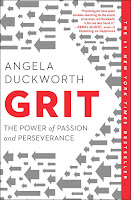What is Genius? Part IV - Grit
Thomas Edison once said "Genius is one percent inspiration and ninety-nine percent perspiration." He is best known for the invention of the electric lightbulb, and had more than a thousand patents under his belt. Edison wanted to convey that hard work and perseverance, more than anything, are needed for greatness. These days I think of "perspiration" as grit.
Angela Duckworth, a best selling author and speaker, defines grit as passion and sustained persistence applied toward long-term achievement. It is not just hard work, but toiling relentlessly on a passion you stay loyal to despite ups and downs. Especially the downs. It was generally believed that grit is somewhat genetic, but we now know it is mostly an acquired trait.
Just like IQ tests, Duckworth created a grit scale, which computes a subject's passion and perseverance ratings before yielding a final grit score. It is often easy to overlook the role of passion in shaping grit. Passion is what ensures perseverance, since doing what you love feels a lot less like work. My score was 4.5 out of 5 (90th percentile). It seemed a little low but sometimes I just do not know myself that well. Feel free to take a crack yourself.
To be a genius, you need to apply a skill that creates a significant contribution to society. Let's call that achievement (in the highest sense). In order to hone a trade, one requires:
Talent x Effort => Skill
To turn a skill into an achievement, one requires:
Skill x Effort => Achievement
or
Talent x Effort² => Achievement
Notice how effort is needed for both formulas, and monumental effort (squared) is required to attain achievement. No doubt this is the perspiration to which Edison was referring. It is also important to note that the kind of effort required is not just plain hard work, but deliberate practice. Deliberate practice in its simplest portrayal has four elements:
- A clearly defined stretch goal
- Full concentration and effort
- Immediate and informative feedback
- Repetition with reflection and refinement
Given the hard work and long hours required, it is not surprising that many geniuses brought forth their contributions late into adulthood. Newton wrote Principia in his forties, when the average life expectancy in 1600 England was 40. Geniuses also often endure repeating cycles of failure before succeeding. And grit is the one thing that keeps you going when the going gets tough. Forget not, when you finally succeed, you will have grit to thank.
Now that we have explored intelligence, creativity and grit, let's look at one final ingredient that helps create genius.
- PTS




Comments
Post a Comment